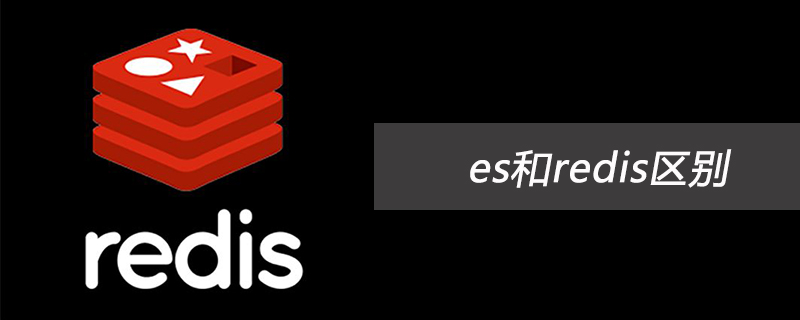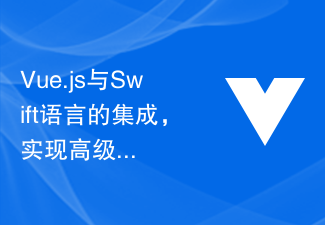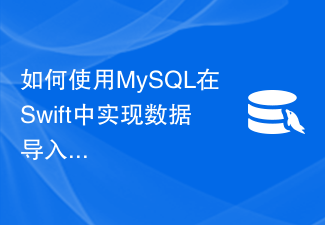How to build a high-performance push service using Redis and Swift
Push service is one of the very important functions in modern mobile applications, which allows developers to send real-time messages, notifications or other types of information to users . However, building a high-performance push service is not an easy task. In this article, we will introduce how to use Redis and Swift to build a high-performance push service to meet users' real-time notification needs.
- Build a Redis server
First, we need to install and configure a Redis server. Redis is a high-performance in-memory database that can store key-value pairs and supports real-time messaging using a publish/subscribe model. You can download and install Redis from the official Redis website, and perform basic configuration according to the documentation.
- Using the publish/subscribe function of Redis
The publish/subscribe function of Redis is the core of implementing push service. We can treat each user device as a subscriber. When there is a new message, we can use the publishing function of Redis to send the message to all subscribers.
In Swift code, we can use Redis client library, such as 'perfect-redis' to achieve communication with the Redis server. First, we need to connect to the Redis server using the following code:
import PerfectRedis // 创建Redis客户端 let redis = Redis() try redis.connect(host: "localhost", port: 6379)
Then, we need to add the user’s device ID to the subscription list:
// 订阅
try redis.subscribe(to: "push_notifications") { (msg) in
// 处理收到的消息
// 可以根据需要进行消息过滤、解析等操作
}With the above code, we have successfully added The device is subscribed to a channel named 'push_notifications'. When a new message is published to the channel, we can process the received message in the closure.
- Publish push messages
When we have new messages that need to be pushed to users, we only need to use the following code to publish the messages to the 'push_notifications' channel:
// 发布消息 try redis.publish(channel: "push_notifications", message: "New notification")
The above code will publish a new message in the 'push_notifications' channel.
- Handling push messages
When our application receives a push message, we can use PushKit or other push frameworks to send the message to the user device. After the user opens the app, we can display notifications as needed and handle the user's behavior accordingly.
- High performance optimization
In order to further improve the performance of the push service, we can consider the following optimization strategies:
- Use connection pool: To avoid frequently establishing and disconnecting connections to the Redis server, we can use a connection pool to manage connection reuse. You can use a connection pool library such as 'SwifterSockets' to implement the connection pool function.
- Batch sending messages: When there are multiple messages that need to be pushed, we can consider packaging these messages into a message list and then sending them to each subscriber at once.
- Asynchronous operations: Consider using Swift's asynchronous operations to handle subscription and publishing operations to avoid blocking the main thread.
- Message filtering: If we only want to push specific types of messages to users, we can add subscription conditions when subscribing to filter out messages that are not of interest.
Summary
Using Redis and Swift to build a high-performance push service can meet the needs of real-time messaging. We can use the publish/subscribe function of Redis to achieve fast message delivery and improve the performance of the service through some optimization strategies. I hope this article can help you build a high-performance push service.
The above is the detailed content of How to build a high-performance push service using Redis and Swift. For more information, please follow other related articles on the PHP Chinese website!
 es和redis区别Jul 06, 2019 pm 01:45 PM
es和redis区别Jul 06, 2019 pm 01:45 PMRedis是现在最热门的key-value数据库,Redis的最大特点是key-value存储所带来的简单和高性能;相较于MongoDB和Redis,晚一年发布的ES可能知名度要低一些,ES的特点是搜索,ES是围绕搜索设计的。
 苹果发布用于同态加密的开源 Swift 软件包,已部署在 iOS 18 中Jul 31, 2024 pm 01:10 PM
苹果发布用于同态加密的开源 Swift 软件包,已部署在 iOS 18 中Jul 31, 2024 pm 01:10 PM7月31日消息,苹果公司昨日(7月30日)发布新闻稿,宣布推出新的开源Swift包(swift-homomorphic-encryption),用于在Swift编程语言中启用同态加密。注:同态加密(HomomorphicEncryption,HE)是指满足密文同态运算性质的加密算法,即数据经过同态加密之后,对密文进行特定的计算,得到的密文计算结果在进行对应的同态解密后的明文等同于对明文数据直接进行相同的计算,实现数据的“可算不可见”。同态加密技术可以计算加密数据,而且不会向操作过程泄露底层的未加
 一起来聊聊Redis有什么优势和特点May 16, 2022 pm 06:04 PM
一起来聊聊Redis有什么优势和特点May 16, 2022 pm 06:04 PM本篇文章给大家带来了关于redis的相关知识,其中主要介绍了关于redis的一些优势和特点,Redis 是一个开源的使用ANSI C语言编写、遵守 BSD 协议、支持网络、可基于内存、分布式存储数据库,下面一起来看一下,希望对大家有帮助。
 Vue.js与Swift语言的集成,实现高级iOS应用的开发和测试的建议Aug 01, 2023 am 09:53 AM
Vue.js与Swift语言的集成,实现高级iOS应用的开发和测试的建议Aug 01, 2023 am 09:53 AMVue.js是一种流行的JavaScript框架,用于构建用户界面。而Swift语言是一种用于iOS和macOS应用程序开发的编程语言。在本文中,我将探讨如何将Vue.js与Swift语言集成,以实现高级iOS应用程序的开发和测试。在开始之前,我们需要确保你已经安装了以下软件和工具:Xcode:用于开发和编译iOS应用程序的集成开发环境。Node.js:用于
 如何使用MySQL在Swift中实现数据导入和导出功能Aug 01, 2023 pm 11:57 PM
如何使用MySQL在Swift中实现数据导入和导出功能Aug 01, 2023 pm 11:57 PM如何使用MySQL在Swift中实现数据导入和导出功能导入和导出数据是许多应用程序中常见的功能之一。本文将展示在Swift语言中使用MySQL数据库实现数据导入和导出的方法,并提供代码示例。要使用MySQL数据库,首先需要在Swift项目中引入相应的库文件。你可以通过在Package.swift文件中添加以下依赖来实现:dependencies:[
 实例详解Redis Cluster集群收缩主从节点Apr 21, 2022 pm 06:23 PM
实例详解Redis Cluster集群收缩主从节点Apr 21, 2022 pm 06:23 PM本篇文章给大家带来了关于redis的相关知识,其中主要介绍了Redis Cluster集群收缩主从节点的相关问题,包括了Cluster集群收缩概念、将6390主节点从集群中收缩、验证数据迁移过程是否导致数据异常等,希望对大家有帮助。
 详细解析Redis中命令的原子性Jun 01, 2022 am 11:58 AM
详细解析Redis中命令的原子性Jun 01, 2022 am 11:58 AM本篇文章给大家带来了关于redis的相关知识,其中主要介绍了关于原子操作中命令原子性的相关问题,包括了处理并发的方案、编程模型、多IO线程以及单命令的相关内容,下面一起看一下,希望对大家有帮助。
 一文搞懂redis的bitmapApr 27, 2022 pm 07:48 PM
一文搞懂redis的bitmapApr 27, 2022 pm 07:48 PM本篇文章给大家带来了关于redis的相关知识,其中主要介绍了bitmap问题,Redis 为我们提供了位图这一数据结构,位图数据结构其实并不是一个全新的玩意,我们可以简单的认为就是个数组,只是里面的内容只能为0或1而已,希望对大家有帮助。


Hot AI Tools

Undresser.AI Undress
AI-powered app for creating realistic nude photos

AI Clothes Remover
Online AI tool for removing clothes from photos.

Undress AI Tool
Undress images for free

Clothoff.io
AI clothes remover

AI Hentai Generator
Generate AI Hentai for free.

Hot Article

Hot Tools

SAP NetWeaver Server Adapter for Eclipse
Integrate Eclipse with SAP NetWeaver application server.

EditPlus Chinese cracked version
Small size, syntax highlighting, does not support code prompt function

MantisBT
Mantis is an easy-to-deploy web-based defect tracking tool designed to aid in product defect tracking. It requires PHP, MySQL and a web server. Check out our demo and hosting services.

SublimeText3 Linux new version
SublimeText3 Linux latest version

PhpStorm Mac version
The latest (2018.2.1) professional PHP integrated development tool





